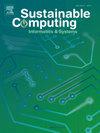基于双层决策树的可持续城市智能电力分析框架
IF 3.8
3区 计算机科学
Q1 COMPUTER SCIENCE, HARDWARE & ARCHITECTURE
引用次数: 0
摘要
物联网(IoT)范式的革命性影响极大地增强了电力消费的服务交付方面,允许智能能源分配和值得信赖的电器。目前的研究提出了一种利用物联网技术检测智能家居用电量的新技术。电力分配不合理,电力资源配置效率低下,严重影响了人们的日常生活。本研究评估了电网运营商分配电能资源的时空效率。通过计算地理区域内每个居民的时空利用测度,实现能源的有效配置。为了帮助电网管理者优化能源的时空配置,提出了一种基于两级阈值的决策树模型。为了进行性能评估,四个智能家居在模拟环境中被跟踪了两个月。延迟(119.61s)、可靠性(82.23%)、稳定性(71.12%)、分类有效性(精度(95.56%)、灵敏度(95.96%)和特异性(95.25%))和决策效率(92.21%)的统计结果表明,该方法明显优于当前的数据分析技术。本文章由计算机程序翻译,如有差异,请以英文原文为准。
Bi-level decision tree-based smart electricity analysis framework for sustainable city
The revolutionizing influence of the Internet of Things (IoT) paradigm has greatly enhanced the service-delivery aspects of electricity consumption, allowing for smart energy distribution and trustworthy electric appliances. The current research presents a novel technique for detecting electricity usage in smart homes using IoT technology. Poor electricity distribution has greatly impacted daily life along with inefficient power resource allocation. This research assesses the spatial–temporal efficiency with which power grid operators distribute electrical energy resources. The efficient distribution of energy resources is achieved by calculating the spatial–temporal utilization measure for each residence of a geographical region. Also, to help power grid managers optimize the spatial–temporal allocation of energy resources, a two-level threshold-based decision-tree model is presented. For performance assessment, four smart homes are tracked for 2 months in a simulated environment. Statistical results acquired for Delay (119.61s), Reliability (82.23%), Stability (71.12%), Classification Effectiveness (Precision (95.56%), Sensitivity (95.96%), and Specificity (95.25%)), and Decision-making Efficiency (92.21%) show that the presented approach significantly outperforms state-of-the-art data analysis techniques.
求助全文
通过发布文献求助,成功后即可免费获取论文全文。
去求助
来源期刊

Sustainable Computing-Informatics & Systems
COMPUTER SCIENCE, HARDWARE & ARCHITECTUREC-COMPUTER SCIENCE, INFORMATION SYSTEMS
CiteScore
10.70
自引率
4.40%
发文量
142
期刊介绍:
Sustainable computing is a rapidly expanding research area spanning the fields of computer science and engineering, electrical engineering as well as other engineering disciplines. The aim of Sustainable Computing: Informatics and Systems (SUSCOM) is to publish the myriad research findings related to energy-aware and thermal-aware management of computing resource. Equally important is a spectrum of related research issues such as applications of computing that can have ecological and societal impacts. SUSCOM publishes original and timely research papers and survey articles in current areas of power, energy, temperature, and environment related research areas of current importance to readers. SUSCOM has an editorial board comprising prominent researchers from around the world and selects competitively evaluated peer-reviewed papers.
 求助内容:
求助内容: 应助结果提醒方式:
应助结果提醒方式:


